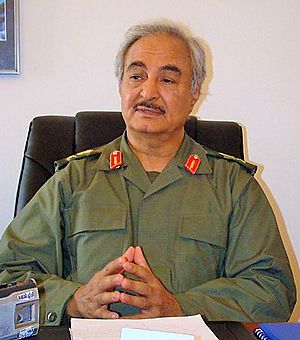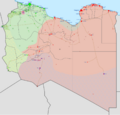Khalifa Haftar facts for kids
Quick facts for kids
Field Marshal
Khalifa Haftar
|
|
|---|---|
|
خليفة حفتر
|
|
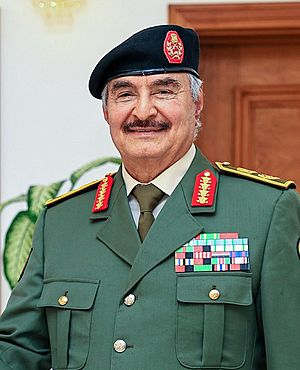
Haftar in 2023
|
|
| Supreme Commander of the Libyan National Army | |
| Assumed office 2 March 2015 |
|
| President | Aguila Saleh Issa (acting) Mohamed al-Menfi |
| Prime Minister | Abdullah al-Thani Abdul Hamid Dbeibeh Fathi Bashagha Osama Hammad (acting) |
| Personal details | |
| Born |
Khalifa Belqasim Omar Haftar
7 November 1943 Ajdabiya, Libya |
| Citizenship | Libya United States |
| Children | 6, including Saddam |
| Awards | Red diploma (high honours) – M.V. Frunze Military Academy |
| Signature | |
| Military service | |
| Allegiance |
|
| Branch/service | |
| Years of service | 1966–1987; 2011–present |
| Rank | |
| Commands | Libyan National Army |
| Battles |
|
| Criminal conviction | |
| Criminal status | Void |
| Conviction(s) | Treason against Muammar Gaddafi |
| Trial | Trial in absentia |
| Criminal penalty | Capital punishment |
|
Wanted by
|
|
| Wanted since | 1993 |
Khalifa Haftar (Arabic: خليفة حفتر, romanized: Ḵalīfa Ḥaftar; born 7 November 1943) is a military leader and politician from Libya. He is the commander of the Libyan National Army (LNA), which is based in Tobruk. Since 2015, he has led the armed forces that support the Libyan House of Representatives. He has been a key figure in eastern Libya since 2017.
Haftar was born in Ajdabiya. He served in the Libyan Army under Muammar Gaddafi. He was part of the group that helped Gaddafi come to power in 1969. Haftar also fought in the Yom Kippur War in 1973. Later, he took part in the Chadian–Libyan War (1978-1987). He became a top officer in Chad for the Libyan military. In 1987, Chadian forces captured him, which was a big problem for Gaddafi. While a prisoner, Haftar and other officers formed a group to try and remove Gaddafi from power. He was released around 1990 and lived in the U.S. for almost 20 years, becoming a U.S. citizen. In 1993, while in the U.S., a court in Libya sentenced him to death in his absence.
Haftar played an important role in the forces that removed Gaddafi in 2011 during the First Libyan Civil War. In 2014, he led the Libyan Army when the General National Congress (GNC) refused to step down. Haftar started a campaign against the GNC. This led to new elections but also started the Second Libyan Civil War. Haftar is known for his military experience and for leading forces that control parts of Libya. In November 2021, he announced he would run for president in the election that was later delayed.
Haftar speaks Arabic, English, Italian, and Russian, and some French. He is a citizen of both Libya and the United States.
Contents
Early Life and Education
Khalifa Belqasim Omar Haftar was born in Ajdabiya, Libya, in 1943. His family belonged to the Firjan tribe. He went to school in Ajdabiya in 1957. Then, he moved to Derna for his high school education from 1961 to 1964. He joined the Benghazi Military University Academy in 1964 and finished his studies there in 1966.
In the late 1970s, he received military training in the Soviet Union. He completed a special three-year program for foreign officers at the Frunze Military Academy. Haftar also had more military training in Egypt. He served in the artillery part of the army.
Early Years in the Gaddafi Government
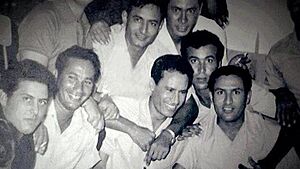
As a young army officer, Haftar helped Muammar Gaddafi take power in Libya in 1969. He helped overthrow Libya's King Idris. Soon after, Haftar became a top military officer for Gaddafi. He led Libyan troops who supported Egyptian forces in the Yom Kippur War in 1973.
Haftar was part of the Free Officers movement, which was the group that took down the monarchy. He was known for supporting a government that was not based on religion. He was also a member of the Libyan Revolutionary Command Council, which governed Libya right after the coup. Haftar later became Gaddafi's military Chief of Staff. In the late 1980s, Haftar commanded Libyan forces during the Chadian–Libyan War, which Libya lost.
War with Chad
By 1986, Haftar was a colonel and the main officer in charge of Gaddafi's military forces in Chad. This was during the Chadian–Libyan War. In 1987, Haftar and about 600-700 of his soldiers were captured as prisoners of war after a defeat.
After this battle, Gaddafi said he no longer supported Haftar and the other Libyan prisoners. One reason might be that Gaddafi had agreed to remove all Libyan forces from Chad, and Haftar's actions went against this agreement. Another reason could be that Gaddafi worried Haftar might return to Libya as a hero and challenge his rule.
Opposition with the United States
Gaddafi wanted Haftar's soldiers returned to Libya. However, the Americans helped them go to Zaire instead. There, some soldiers decided to return to Libya. In late 1987, Haftar and other officers joined the National Front for the Salvation of Libya (NFSL), a group that opposed Gaddafi and was supported by the U.S.
On June 21, 1988, Haftar announced the creation of the NFSL's military part, called the Libyan National Army, under his leadership. When Zaire did not receive U.S. money, it sent the remaining soldiers to Kenya. Kenya only allowed them to stay for a short time. The CIA then helped Haftar and 300 of his soldiers move to the United States around 1990.
In March 1996, Haftar took part in an uprising against Gaddafi in eastern Libya, but it failed. He then returned to the U.S. Haftar lived in Virginia, near Washington, D.C.. He supported efforts to remove Gaddafi from power.
Role in the First Libyan Civil War
In 2011, Haftar returned to Libya when the Libyan Crisis began. He supported the forces against Gaddafi in the First Libyan Civil War. In March, a military spokesperson said Haftar was appointed commander of the military, but the National Transitional Council denied this. By April, Haftar was the commander of ground forces. On November 17, 2011, Haftar was chosen as the overall commander of the new Libyan Army. This was because of his military experience and his support for the revolution that overthrew Gaddafi.
Start of Operation Dignity
In February 2014, Haftar appeared on TV to say that the General National Congress (GNC), the elected parliament, had been dissolved. He asked for a temporary government to hold new elections and urged Libyans to protest against the GNC. His call did not lead to a big uprising. The Prime Minister at the time called Haftar's actions a "coup attempt."
Haftar then started meeting with people across Libya and secretly building an army with other former officers. Three months later, on May 16, he launched "Operation Dignity." This was an attack by air and ground forces against certain groups in Benghazi and against the Libyan parliament. On May 20, the GNC announced that national elections would be held on June 25, 2014.
Later in May, many members of parliament and military leaders supported Operation Dignity. On June 4, a car bomb exploded near Haftar's home, killing four people, but Haftar was not hurt.
In eastern Libya, Haftar's forces seemed to gain support. Many marches were held to support Operation Dignity. In the June 25 parliamentary elections, groups that were not religious won more power. The new parliament called Haftar's opponents "terrorists."
In November 2014, Haftar's forces attacked Mitiga International Airport in Tripoli, causing it to close temporarily. In response, a court in Tripoli issued an arrest warrant for Haftar.
Leading Role in the Second Libyan Civil War
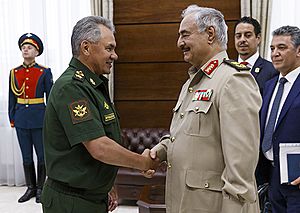
Haftar was officially made commander of the Libyan National Army (LNA) by the House of Representatives on March 2, 2015. The Libyan armed forces later split into the LNA, led by Haftar, and the Libyan Army controlled by the Government of National Accord (GNA).
After three years of fighting, Haftar announced in July 2017 that his forces had taken full control of Benghazi, Libya's second-largest city. This victory showed his growing military and political goals. Some critics said he fought for years to gain more power for himself.
Some people praised Haftar for uniting forces against the Islamic State. However, others said his role in fighting ISIS was exaggerated or done for his own benefit. For example, in early 2016, Haftar's forces reportedly bombed a group that had successfully removed ISIS from Derna.
Experts have wondered if the LNA could control all of Libya. They also questioned if Haftar would allow any other military or elected leader to guide a national army or government in the future.
Haftar believes that Operation Dignity should remove certain groups from Libya. However, he has worked with some religious groups in eastern Libya. These groups help him control areas and fight against other groups. Haftar needs their support because he lacks enough troops. In return, these groups gain more power and influence.
In July 2017, a video showed Haftar's forces executing suspected fighters. This led the United Nations to ask the LNA to investigate. In areas under his control, some sources have reported that his forces have limited people's freedoms.
As of August 2016, Haftar refused to support the new United Nations Security Council-backed Government of National Accord. This made the United States and its allies believe he was making Libya less stable. Some experts said Haftar might be the biggest problem for peace in Libya. They thought he feared losing his influence if he worked with the GNA.
The United Arab Emirates and Egypt continue to support Haftar. Reports have suggested that air forces from Britain, France, the U.S., and the UAE have helped Haftar's forces. Egypt's leader, Sisi, openly supports Haftar. Haftar also receives private support from leaders in Saudi Arabia and the United Arab Emirates.
In November 2016, Haftar visited Russia to meet with top officials. He was seeking weapons and Russia's support. Russia has since treated wounded LNA soldiers and printed money for the government in Tobruk. Russia also signed agreements that might allow it to build military bases in eastern Libya. Experts believe Russia sees Haftar as the best way to fight extremism in Libya.
In 2017, some people accused Haftar of serious actions during the Siege of Derna. They claimed he told his fighters not to take prisoners.
On April 4, 2019, Haftar ordered his military forces to advance on Tripoli, the capital of the internationally recognized government. This action was criticized by the United Nations. On April 7, eastern Libyan forces launched an airstrike on southern Tripoli. In May 2019, Amnesty International accused Haftar of actions that were not allowed during wartime in Tripoli.
After military setbacks in June 2019, Haftar ordered the LNA to target Turkish ships and companies. He also banned flights and ordered the arrest of Turkish citizens in Libya. After these threats, six Turkish civilians were taken by the Libyan National Army on July 1.
Haftar's Influence
Haftar was the leader of the "Tobruk" government, which controlled much of eastern and some southern and western parts of Libya during the Second Libyan Civil War. During his leadership, local elections in some areas were stopped. The head of the United Nations Support Mission in Libya (UNSMIL) described Haftar as someone who governs with a "strong hand." Under Haftar's control, some local councils were replaced by military leaders.
In June 2019, the Government of National Accord found weapons in a rebel area. These included missiles made by the U.S. and labeled for the "armed forces of the United Arab Emirates." These weapons were found in a rebel base, supporting Haftar's army.
On April 27, 2020, Haftar announced on TV that the LNA would accept a public request to govern Eastern Libya. This made Haftar the leader of that area. This raised questions about the role of the Libyan House of Representatives, which had been the civilian government for areas controlled by the LNA.
In early April 2021, a group based in Haftar's territories launched an attack to take control of Chad. The president of Chad was killed in this attack.
On September 23, 2021, Haftar temporarily stepped down from his role as LNA commander. This was so he could run in the 2021 Libyan general election, which was supposed to happen on December 23. Libyan law requires officials to pause their current work three months before an election. The election has since been delayed.
Haftar's forces have controlled oil terminals in Libya since 2015. It is believed that his forces have helped protect the production of Libyan crude oil.
Family and Leadership

Haftar has at least six sons and one daughter. His sons, Captain Saddam Haftar and Captain Khalid Haftar, are officers in the Libyan National Army. Another son, Al-Sadiq Haftar, is also in Libya. Belqasim Haftar works as his father's main political advisor. Two other sons, Uqba Haftar and Al-Muntasir Haftar, and his daughter Asma Haftar live in the United States.
In October 2021, a newspaper reported that Belqasim Haftar signed a contract with an Israeli company to help with his father's presidential campaign.
In November 2021, Saddam Haftar visited Israel on behalf of his father. He was reportedly seeking military help and diplomatic support in exchange for improving relations. Later that month, Saddam Haftar reportedly helped other presidential candidates register for the election. However, ten days later, a brigade led by Saddam and Khalid stopped judges from hearing an appeal related to a candidate's participation in the election.
In March 2022, Uqba Haftar began selling his family's properties in the United States. This happened after a U.S. judge ruled that Khalifa could be sued for certain actions.
In December 2022, Saddam Haftar tried to take control of banks in eastern Libya. Later that month, a brigade led by Saddam Haftar was accused of actions that were not allowed during wartime.
In January 2023, Khalifa Haftar said he would withdraw from the Libyan presidential election if his sons, Saddam and Belqasim, were allowed to run. Saddam Haftar is seen as a possible future leader after Khalifa Haftar.
Health
On April 12, 2018, there were reports that Haftar was in a coma after a stroke and was in the hospital in Paris. A spokesperson for the LNA first denied these reports. Some local media later reported he had died. However, people close to him said he was alive. On April 25, it was confirmed that Haftar was alive and had returned to Benghazi after getting treatment in Paris.
Images for kids
See also
 In Spanish: Jalifa Hafter para niños
In Spanish: Jalifa Hafter para niños
 | Aaron Henry |
 | T. R. M. Howard |
 | Jesse Jackson |


